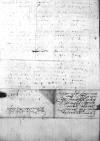Letter #419
Nicolas PERRENOT de Granvelle to Ioannes DANTISCUSToledo, 1529-01-15
| received Valladolid, [1529]-01-23 Manuscript sources:
Auxiliary sources:
Prints:
| ||||||||||
Text & apparatus & commentary Plain text Text & commentary Text & apparatus
Eximio Generosoque Viro, Domino
Magnifice ac Generose Domine.
Vix dici queat, quantum voluptatis susceperim ex cf.
Quantum ad id, quod
Salutavi dominos
Quod vero Dominatio Vestra commendet negotia serenissimorum
Cui rursus atque iterum salutem et vale dico.
Ex
E(idem) or E(iusdem)⌈E(idem)E(idem) or E(iusdem)⌉
D(ominationi) or D(ominationis)⌈D(ominationi)D(ominationi) or D(ominationis)⌉
Vestrae deditissimus s... illegible⌈...... illegible⌉ssimusque


 AAWO, AB, D.66, f. 181v
AAWO, AB, D.66, f. 181v